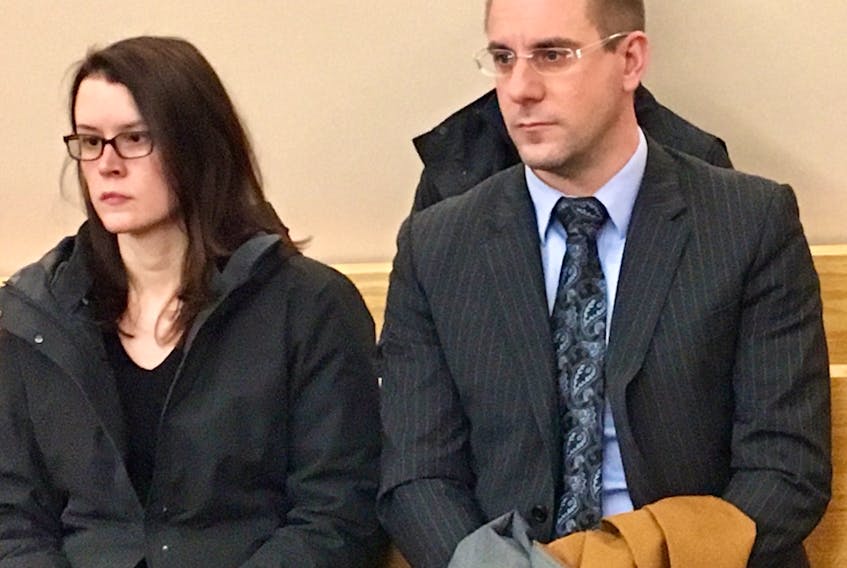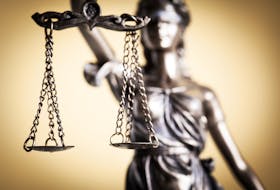For the Crown, it’s a black and white case — the light was green and not red.
What’s also clear to the lawyer prosecuting the case against Const. Joe Smyth is that the RNC officer broke the law by deliberately issuing a false traffic ticket to a motorcyclist.
“Officer Smyth crossed the line,” Lloyd Strickland said in his closing arguments in Smyth’s trial at provincial court in St. John’s Tuesday.
Smyth, 40, is charged with obstructing justice as a result of an incident May 12, 2017, when he stopped a motorcycle on Torbay Road and issued the driver four traffic tickets, including one for running a red light. Footage from the motorcyclist’s Go-Pro camera revealed the light was actually green.

Smyth told the court Monday that while he was driving southbound in rush-hour traffic, he honestly thought the motorcyclist’s northbound light was red. He said he made a split-second observation and wasn’t out to get the driver, Sayed Husaini, whose orange Honda Repsol matched the description of the one Smyth had pursued but got away from him a month before.
Strickland said while “anything’s possible,” assessing the whole picture, “it’s an extremely implausible error. … Unless you’re colour blind — and I’ve heard no evidence of that — it’s a difficult mistake to make.”
Given the timing of the lights and the heavy flow of traffic heading through the intersection at the same time as the motorcycle, Strickland said, it’s highly unlikely Smyth mistook the light for red.
“You have to be oblivious to the traffic around. There’s a wave of traffic going through the light,” he said. “You’d have to be oblivious to everything going on.”
Strickland said some things Smyth said would have been impossible.
He pointed out Smyth wrote in his notes that Husaini went through a “new red light,” meaning it had just turned red when, in fact, the light had been green for several seconds.
In Smyth’s “split-second observation,” Strickland questioned how he could have possibly seen the motorcyclist driving in between cars and make an improper pass. Watching the Go-Pro video, he said, Husaini doesn’t even attempt to pass a car until eight seconds after proceeding through the light.
“It’s an allegation that (Smyth) is exaggerating,” Strickland said, “an allegation that seemed to be pumped up.
“It’s one thing to make that one egregious error (mistaking the green light for red), but there were others.”
Strickland suggested Smyth might have been out to get Husaini.
“He’s out to somehow punish him. That seems plausible,” he said. “I don’t know, maybe he thought he deserved those tickets. Maybe he believed Mr. Husaini is a hazard on the road.”
Defence lawyer Jerome Kennedy questioned Husaini’s credibility, noting his arrogant and dismissive behaviour on the stand, and his refusal to answer general questions about such things as his work and birthplace.
However, Strickland said Smyth’s credibility should also be questioned.
“He has issues as well,” Strickland said. “He’s the one who identified a green light as a red light.”
Kennedy called Strickland’s arguments, “shameful,” saying the Crown should call evidence, not give it.
“There’s nothing, other than what’s on the video, he said that can be accepted. … He painted himself as the innocent victim.” — Jerome Kennedy on Sayed Husaini
In his final arguments, Kennedy cautioned Judge Mike Madden to be careful in how he used the motorcyclist’s video in rendering his verdict, noting it shouldn’t be based on that evidence alone. He said there were many more factors.
He said it’s common for people to dispute a traffic ticket, noting many are contested in traffic court every year — more than 1,145 in 2018.
“There aren’t very many who say, ‘Thank you very much, officer. I deserved that,’” Kennedy said.
However, he said this case ended up in criminal court because Husaini found out the officer was Smyth — who had fatally shot Don Dunphy in 2015 and was questioned at an inquiry earlier in 2017.
Kennedy said, “I suggest he was the menace police were looking for.
“There’s nothing, other than what’s on the video, he said that can be accepted. … He painted himself as the innocent victim.”
Kennedy said Smyth took his time getting across town to Torbay Road, even stopping to issue a traffic ticket on the Outer Ring Road.
“There’s absolutely nothing that can lead one to believe he was going all out to get Mr. Husaini,” he said.
He said Smyth made a mistake and in no way wilfully obstructed justice.
“In light of all this, you have to have reasonable doubt,” Kennedy told Madden. “Not guilty is the only reasonable verdict.”

Earlier in the day, Dr. Marina Hewlett, the psychologist who treated Smyth after the shooting and the inquiry, testified that the stress Smyth was experiencing may have played a role in his writing an erroneous traffic ticket.
Hewlett said Smyth was experiencing symptoms of acute stress disorder, with nightmares and flashbacks, and should not have returned to operational duty as soon as he did.
“He was certainly experiencing anticipatory stress anxiety,” she said. “Put that with quite a bit of sensory stimulation. He may have been hyper-focused on the one scene.”
Hewlett — who saw Smyth for 14 sessions — said the officer’s visual judgment and perception may have been affected by his stress level at the time he made the traffic stop. She said he might have been hyper focused and hyper vigilant, which would make it easy to make mistakes.
“Errors are not uncommon when you have a lot of stimuli,” said Hewlett, noting the traffic and noise at the time. “Images could easily be distorted.”
The traffic stop happened a month after the Dunphy inquiry ended and before the report was released.
Smyth had been on sick leave after the shooting, but returned to work in the traffic division. Smyth testified Monday that he thought it would do him good to get back to work.
“Every police (officer) I’ve worked with feels that way. It’s in their culture to be strong,” Hewlett said. “(Experiencing mental anguish) is considered a weakness, (but) I think it’s changing now.”
Madden will render his verdict Feb. 22.
Twitter: @TelyRosie
RELATED:









